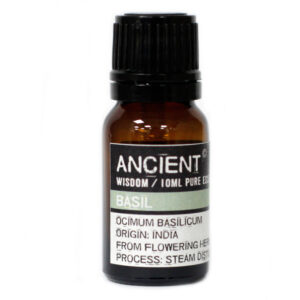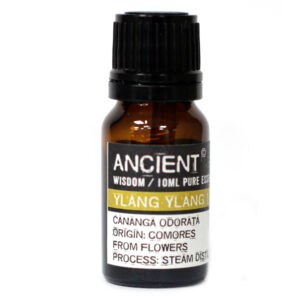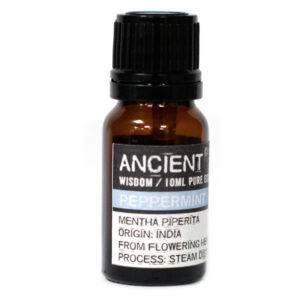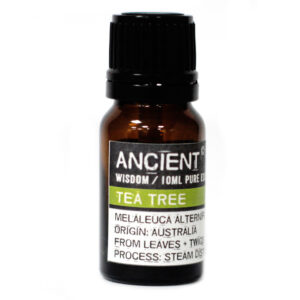
Niaouli Essential Oil
Niaouli Essential Oil isn’t the greatest smelling essential oil. What it lacks in aromatic appeal, however, it makes up for in its therapeutic benefits. It’s an excellent choice for use with respiratory concerns, skin infections and acne.
£4.25 – £79.95Price range: £4.25 through £79.95
Description
The World of Aromatherapy’s Niaouli Essential Oil
🍃 Step into the invigorating world of Niaouli Essential Oil, where nature’s potency meets gentle refreshment.
🌿 Harvested from the evergreen Niaouli tree, this oil boasts a sweet, camphoraceous aroma that revitalises and reenergises.
💆♀️ Beyond its captivating scent, Niaouli offers therapeutic properties, known to bolster the immune system and clear respiratory pathways.
🌍 Our promise to you is simple: pure, unadulterated essence. Our Niaouli Essential Oil reflects our dedication to eco-conscious practices and utmost quality.
🌟 Let The World of Aromatherapy guide your senses to rejuvenation, clarity, and nature’s robust embrace with the essence of Niaouli.
Latin Name : Melaleueca Viridiflora
Part Of Plant Used : Leaves & Twigs
Source : Indonesia
Extraction Method : Steam Distillation
Niaouli Essential Oil isn’t the greatest smelling essential oil. What it lacks in aromatic appeal, however, it makes up for in its therapeutic benefits. It’s an excellent choice for use with respiratory concerns, skin infections and acne.
Aromatically, Niaouli Essential Oil is generally not considered a pleasant essential oil. The aroma is camphorous, earthy and a bit harsh. It’s never a good idea to form an opinion of the aroma of an essential oil by simply smelling it straight from the bottle.
The pain-relieving property of this oil makes it a very good analgesic. It eliminates pain by inducing numbness in the nerves and by desensitizing the area. It is very effective in relieving the pain of headaches, migraines, toothaches, earaches, and muscle and joint pain, as well as pain due to sprains.
This oil stimulates the circulation of the blood and lymph, thereby preventing the accumulation of uric acid in the joints and bringing warmth to various parts of the body. These two factors together help give relief from rheumatism, arthritis, and gout.
Open wounds are prone to infections since bacteria, fungi, and other microbes have a very good chance of getting into the bloodstream through these wounds. Bacteria also reside in the urogenital tracts, colon, prostate, intestines, and kidneys and cause infections of the urethra and other sensitive body parts. The essential oil of Niaouli, thanks to its antiseptic properties, can inhibit bacterial growth in those areas and gives good protection against sepsis, tetanus, and infections of the other internal organs.
Additional information
| Weight | 0.04 kg |
|---|---|
| Size | 10ml, 50ml, 500ml |
You must be logged in to post a review.
Related Products
Related products
-

Basil Essential Oil
£5.75 – £139.95Price range: £5.75 through £139.95 Select options This product has multiple variants. The options may be chosen on the product page -

Ylang Ylang I Essential Oil
£6.25 Add to basket -

Peppermint Essential Oil
£4.50 – £69.95Price range: £4.50 through £69.95 Select options This product has multiple variants. The options may be chosen on the product page -

Tea Tree Essential Oil
£3.95 – £69.00Price range: £3.95 through £69.00 Select options This product has multiple variants. The options may be chosen on the product page
Niaouli Essential Oil: A Comprehensive Guide from The World of Aromatherapy
Niaouli Essential Oil is a powerful essential oil that has been used for centuries in traditional medicine. The oil is extracted from the leaves of the Niaouli tree, which is native to Australia and the French Pacific Island chain. Today, Niaouli Essential Oil is widely used in aromatherapy as well as in skincare and other applications.
Niaouli Essential Oil has a number of unique characteristics that make it particularly useful in aromatherapy. The oil has a potent aroma that is both cooling and cleansing, making it ideal for promoting easier breathing and clearing the airways. Additionally, the oil is known to help focus the mind and balance emotions, making it a popular choice for those looking to reduce stress and anxiety.
Key Takeaways
- Niaouli Essential Oil is extracted from the leaves of the Niaouli tree and is widely used in aromatherapy and skincare.
- The oil has a potent aroma that is cooling and cleansing, making it ideal for promoting easier breathing and clearing the airways.
- Niaouli Essential Oil is known to help focus the mind and balance emotions, making it a popular choice for reducing stress and anxiety.
Origins of Niaouli Essential Oil
Niaouli essential oil is a colourless oil that is extracted from the twigs and leaves of the Niaouli tree, scientifically known as Melaleuca quinquenervia. The Niaouli tree, which is an evergreen species, is native to Australia, Papua New Guinea, and the French Pacific Islands. It is also found in New Caledonia and Madagascar.
The history of Niaouli essential oil dates back to the late 18th century when French explorers collected various plants of the Myrtaceae family, including Melaleuca, which was still unknown in Europe. In 1862, De Rochas distilled Niaouli leaves for the first time, which led to the discovery of the essential oil.
The Aborigines of Australia have been using decoctions of Niaouli leaves for medicinal purposes for centuries. During Captain Cook’s first voyage to Australia in 1770, naturalists Joseph Banks and Daniel Carl Solander observed the Aborigines using the leaves and collected specimens of the Niaouli tree.
The Niaouli tree is an evergreen species that can grow up to 20 meters tall. It has a papery bark and narrow, pointed leaves that are around 10 cm long. The tree produces white or cream-coloured flowers that are arranged in spikes and bloom in the summer months.
Today, Niaouli essential oil is widely used in aromatherapy due to its numerous benefits. It is known for its antiseptic, analgesic, and anti-inflammatory properties and is used to treat a variety of conditions, including respiratory infections, wounds, and skin irritations.
Extraction of Niaouli Essential Oil
Niaouli essential oil is extracted from the leaves and twigs of the niaouli tree, which is scientifically known as Melaleuca quinquenervia. The extraction process involves steam distillation, which is a common method used for extracting essential oils from plants.
During the steam distillation process, the niaouli leaves and twigs are placed in a distillation chamber with water. The chamber is then heated, causing the water to boil and produce steam. The steam passes through the plant material, carrying the essential oil with it.
The steam and essential oil mixture then passes through a cooling system, which causes the steam to condense back into water. The essential oil, which is lighter than water, floats on top and is collected.
The quality and quantity of the essential oil extracted from niaouli leaves and twigs can vary depending on factors such as the age of the plant, the time of year it was harvested, and the method of distillation used. Generally, the highest quality niaouli essential oil is obtained from mature leaves and twigs that are harvested during the warmer months.
It is important to note that niaouli essential oil should not be confused with niaouli flower oil, which is extracted from the flowers of the niaouli tree using solvent extraction. Niaouli flower oil is not commonly used in aromatherapy due to its potential toxicity.
In summary, niaouli essential oil is extracted through steam distillation of the leaves and twigs of the niaouli tree. The quality and quantity of the essential oil can vary depending on several factors.
Characteristics of Niaouli Essential Oil
Niaouli essential oil is extracted from the leaves of the Melaleuca viridiflora plant. It is a clear to pale-yellow liquid that has a strong and penetrating camphoraceous aroma. The oil is also known for its fresh, citrus, and balsamic notes.
The oil has a thin consistency and is easy to blend with other essential oils. It has a sweet undertone that makes it a popular choice for aromatherapy. Niaouli essential oil is often compared to tea tree and eucalyptus essential oils due to its similar properties, albeit with a subtler scent.
The following table summarizes the characteristics of niaouli essential oil:
| Characteristic | Description |
|---|---|
| Aroma | Strong and penetrating camphoraceous aroma with fresh, citrus, and balsamic notes |
| Consistency | Thin |
| Blends well with | Eucalyptus, lavender, lemon, peppermint, rosemary, tea tree, and thyme essential oils |
| Extraction method | Steam distillation |
| Chemical components | 1,8-cineole, alpha-terpineol, limonene, linalool, and alpha-pinene |
| Shelf life | 2-3 years |
Niaouli essential oil is known for its antiseptic, antibacterial, and anti-inflammatory properties. It is often used to help heal infections, reduce the appearance of small imperfections on the skin such as acne and scarring, and relieve respiratory problems.
In conclusion, niaouli essential oil is a versatile oil with a unique aroma and beneficial properties. Its thin consistency and sweet undertone make it a popular choice for aromatherapy and blending with other essential oils.
Benefits of Niaouli Essential Oil in Aromatherapy
Niaouli essential oil is a popular choice in aromatherapy due to its stimulating and antiseptic properties. The oil is derived from an evergreen tree that is native to New Caledonia, Australia, and the French Pacific island chain.
The oil’s composition varies in hue from pale yellow to a greenish color. It contains a high amount of 1,8-cineole, also known as eucalyptol, which is a common ingredient in many essential oils. This compound is responsible for the oil’s therapeutic properties.
When used in aromatherapy, Niaouli essential oil can provide a range of benefits. Here are some of the most notable:
- Stimulating: Niaouli essential oil is known for its stimulating properties. It can help to energize the mind and body, making it a great choice for those who need a little boost.
- Middle note: Niaouli essential oil is considered a middle note in aromatherapy. This means that it blends well with both top and base notes, making it a versatile oil to use in blends.
- Antiseptic: Niaouli essential oil has antiseptic properties, which makes it useful for treating cuts, wounds, and other skin irritations. It can also help to prevent infection.
- Alternative: Niaouli essential oil is considered an alternative oil in aromatherapy. This means that it can be used as a substitute for other oils that have similar properties.
- 1,8-cineole: Niaouli essential oil contains a high amount of 1,8-cineole, which has been shown to have a range of therapeutic benefits. This compound can help to reduce inflammation, improve respiratory function, and promote mental clarity.
- Diffuse: Niaouli essential oil can be diffused to help purify the air and promote a sense of calm. It can also help to reduce feelings of stress and anxiety.
Overall, Niaouli essential oil is a versatile oil that can provide a range of benefits in aromatherapy. Its stimulating and antiseptic properties make it a popular choice for those looking to boost their mood and promote overall wellness.
Niaouli Essential Oil and the Immune System
Niaouli essential oil is known for its various pharmacological effects, including its immunomodulatory activity. In vitro and in vivo studies have shown that Niaouli essential oil can enhance the immune system’s response to antigens, making it a useful tool in the prevention and treatment of diseases.
The immune system is responsible for protecting the body against harmful pathogens, viruses, and bacteria. Niaouli essential oil has been found to stimulate the immune system, thereby increasing the body’s ability to fight off infections. Studies have shown that Niaouli essential oil can increase the production of white blood cells, which play a crucial role in the immune system’s response to antigens.
In addition to its immune-boosting properties, Niaouli essential oil can also provide respiratory protection. It is commonly used to treat respiratory conditions such as sinusitis and asthma. The oil’s anti-inflammatory properties can help to reduce inflammation in the respiratory tract, making it easier to breathe.
Niaouli essential oil can also provide protection against harmful pathogens. The oil’s antiviral and antibacterial properties make it an effective natural remedy for fighting off infections. It can be used to treat a range of infections, from minor cuts and scrapes to more severe respiratory infections.
Overall, Niaouli essential oil’s immunomodulatory activity makes it a valuable tool in the prevention and treatment of diseases. Its ability to stimulate the immune system and provide respiratory protection makes it a popular choice for those looking for natural remedies to support their health and wellbeing.
Niaouli Essential Oil in Skincare
Niaouli essential oil is a versatile oil that is commonly used in skincare products. It has antiseptic, antibacterial, and antifungal properties, making it an effective ingredient for treating a variety of skin conditions. Here are some benefits of using Niaouli essential oil in skincare:
Acne Treatment
Niaouli essential oil is a natural remedy for acne-prone skin. It helps to reduce inflammation and redness, while also fighting the bacteria that causes acne. When used topically, it can help to unclog pores and prevent future breakouts.
Wound Healing
Niaouli essential oil has antiseptic properties that can help to prevent infection in minor wounds. It also has astringent properties, which can help to stop bleeding and promote healing. When applied topically, it can help to reduce the appearance of scars and promote healthy skin regeneration.
Oily Skin Control
Niaouli essential oil is a natural astringent, which means it can help to control excess oil production in the skin. It helps to tighten pores and reduce the appearance of blemishes, making it an effective ingredient for those with oily or combination skin.
Skincare
Niaouli essential oil is a popular ingredient in skincare products due to its many benefits. It can help to soothe irritated skin, reduce redness, and promote healthy skin regeneration. When used regularly, it can help to improve the overall appearance and texture of the skin.
Pimple Treatment
Niaouli essential oil is an effective natural remedy for treating pimples. It helps to reduce inflammation and redness, while also fighting the bacteria that causes pimples. When applied topically, it can help to unclog pores and prevent future breakouts.
Overall, Niaouli essential oil is a valuable ingredient in skincare products due to its many benefits. It is a natural and effective remedy for a variety of skin conditions, making it a popular choice for those seeking natural skincare solutions.
Antiseptic Properties of Niaouli Essential Oil
Niaouli essential oil is a versatile oil that has been used for centuries for its antiseptic properties. The oil is extracted from the leaves and twigs of the niaouli tree, which is native to Australia. Due to its composition, niaouli essential oil is considered an antiseptic, bactericide, and antimicrobial substance.
The antiseptic properties of niaouli essential oil make it an effective disinfectant for wounds, cuts, and burns. When applied topically, the oil can help prevent infections and promote healing. The oil’s antibacterial and antimicrobial properties also make it effective in treating skin conditions such as acne, eczema, and psoriasis.
Niaouli essential oil is also effective in treating respiratory infections due to its expectorant properties. The oil helps to loosen and expel mucus from the respiratory system, making it easier to breathe. It is also effective in treating sore throats, coughs, and sinusitis.
In addition to its antiseptic properties, niaouli essential oil is also an effective insecticide. The oil contains compounds that repel insects, making it an effective natural insect repellent. It can be used to repel mosquitoes, fleas, and other insects.
Overall, niaouli essential oil’s antiseptic properties make it a valuable addition to any natural medicine cabinet. Its ability to disinfect wounds, treat respiratory infections, and repel insects make it a versatile and effective oil.
Niaouli Essential Oil in Treating Respiratory Conditions
Niaouli essential oil is known for its antiviral and respiratory mucus thinning properties, making it an effective remedy for treating respiratory conditions. It is particularly useful in treating bronchitis, colds, flu, coughs, sore throat, catarrh, and airways.
When used in aromatherapy, Niaouli essential oil can be inhaled through steam inhalation or added to a diffuser. It can also be applied topically when diluted with a carrier oil.
Here are some ways Niaouli essential oil can be used to treat respiratory conditions:
- Bronchitis: Niaouli essential oil helps to clear the airways and reduce inflammation, making it an effective remedy for bronchitis. It can be added to a diffuser or applied topically when diluted with a carrier oil.
- Colds and Flu: Niaouli essential oil helps to boost the immune system and fight off viral infections. It can be added to a diffuser or used in steam inhalation to help clear the sinuses and reduce congestion.
- Coughs: Niaouli essential oil helps to soothe the throat and reduce coughing. It can be added to a diffuser or used in steam inhalation to help clear the airways.
- Sore Throat: Niaouli essential oil has antiseptic and anti-inflammatory properties that can help to soothe a sore throat. It can be added to a diffuser or used in steam inhalation.
- Catarrh: Niaouli essential oil helps to thin mucus and reduce congestion, making it an effective remedy for catarrh. It can be added to a diffuser or used in steam inhalation.
- Airways: Niaouli essential oil helps to clear the airways and improve breathing, making it an effective remedy for respiratory conditions. It can be added to a diffuser or used in steam inhalation.
Overall, Niaouli essential oil is a versatile and effective remedy for treating respiratory conditions. However, it is important to use it properly and always dilute it with a carrier oil before applying it topically.
Pain Relief with Niaouli Essential Oil
Niaouli essential oil is known for its analgesic properties that help in relieving pain. It is an effective natural remedy for various types of pain, including headaches, aches, and rheumatism.
When mixed with a carrier oil such as coconut oil or almond oil, niaouli oil can be massaged into the affected areas to reduce pain. It acts as an anesthetic and numbs the nerves, providing relief from pain.
Niaouli oil can also help reduce joint pain caused by arthritis. It stimulates the lymphatic system and blood circulation, which helps excrete toxic substances and uric acid in painful joints.
In addition to its pain-relieving properties, niaouli oil is also antiseptic, antiviral, antibacterial, and antimycotic. It can protect and restore the skin, making it an excellent healing agent. It is especially useful in restoring the skin after a radiotherapy session when used with aloe vera gel.
Overall, niaouli essential oil is a natural and effective way to relieve pain caused by various conditions. Its analgesic properties make it an excellent alternative to traditional painkillers. However, it is essential to use it as directed and always consult with a healthcare professional before using it.
Other Uses of Niaouli Essential Oil
Niaouli essential oil has a variety of uses beyond its antiseptic and stimulating properties. Here are some of the other uses of niaouli essential oil:
- Respiratory Issues: Niaouli essential oil can help with respiratory issues such as coughs, colds, and congestion. It has expectorant properties that can help to loosen mucus and phlegm, making it easier to breathe. It can also help to reduce inflammation in the respiratory tract, making it an effective treatment for conditions such as bronchitis and asthma.
- Skin Care: Niaouli essential oil can be used to treat a variety of skin conditions, including acne, eczema, and psoriasis. It has antiseptic properties that can help to kill bacteria and reduce inflammation, making it an effective treatment for acne. It can also help to soothe irritated skin and reduce itching and redness.
- Oral Health: Niaouli essential oil can be used to improve oral health. It has antiseptic properties that can help to kill bacteria in the mouth, reducing the risk of gum disease and tooth decay. It can also help to freshen breath and reduce inflammation in the mouth.
- Insect Bites: Niaouli essential oil can be used to treat insect bites and stings. It has anti-inflammatory properties that can help to reduce swelling and itching, making it an effective treatment for mosquito bites and bee stings.
- Urinary Tract Infections: Niaouli essential oil can be used to treat urinary tract infections. It has antiseptic properties that can help to kill bacteria in the urinary tract, reducing the risk of infection. It can also help to reduce inflammation in the urinary tract, making it an effective treatment for conditions such as cystitis.
- Digestive Issues: Niaouli essential oil can be used to treat digestive issues such as indigestion and bloating. It has carminative properties that can help to reduce gas and bloating, making it an effective treatment for digestive discomfort.
Overall, niaouli essential oil is a versatile oil with a variety of uses. It can be used on its own or blended with other essential oils such as tea tree, eucalyptus, lavender, rosemary, pine, and citrus oils. However, it should be used with caution around children, and should not be ingested or applied directly to the skin without dilution.
Safety Considerations for Using Niaouli Essential Oil
When using Niaouli Essential Oil, it is important to take certain safety considerations into account. This essential oil is a potent substance and should be used with care. Here are some safety tips to keep in mind:
Essential Oil Strength
Niaouli Essential Oil is a highly concentrated substance and should always be diluted before use. It is recommended to mix it with a carrier oil such as coconut or jojoba oil before applying it to the skin. The recommended dilution ratio is 2-3 drops of Niaouli Essential Oil per teaspoon of carrier oil.
Safety Precautions
Niaouli Essential Oil should not be used by pregnant or breastfeeding women, or by children under the age of 6. It is also not recommended for people with epilepsy or high blood pressure. If you are unsure whether Niaouli Essential Oil is safe for you, consult a healthcare professional before using it.
Skin Sensitivity
Some people may be sensitive to Niaouli Essential Oil and may experience skin irritation or allergic reactions. It is recommended to perform a patch test before using the oil on a larger area of skin. Apply a small amount of diluted oil to the inside of your forearm and wait 24 hours to see if any reaction occurs.
Dosage
When using Niaouli Essential Oil, it is important to follow the recommended dosage guidelines. Do not exceed the recommended amount, as this can lead to adverse effects. If you experience any negative side effects, such as nausea or headaches, discontinue use immediately.
Storage
Niaouli Essential Oil should be stored in a cool, dry place away from direct sunlight. Keep the bottle tightly sealed when not in use to prevent oxidation and degradation of the oil.
By following these safety considerations, you can enjoy the many benefits of Niaouli Essential Oil while minimizing the risk of adverse effects.
















Reviews
There are no reviews yet.